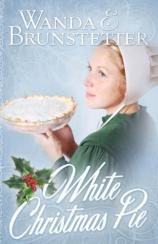White Christmas Pie
Review
White Christmas Pie
Amish-themed novels are hot, hot, hot, and Wanda E. Brunstetter, with more than two million books sold, is a familiar purveyor of the genre. Here, she bakes up plenty of sweet Amish romance, intrigue and forgiveness in WHITE CHRISTMAS PIE. And, yes, there’s a recipe involved.
The story is set in Middlebury, Indiana, just a few hours away from Chicago. Brunstetter’s plot centers on Will Henderson, a 22-year-old Amish man engaged to be married --- and fearful he isn’t good enough to be a reliable husband and father. Will’s mother died when he was five, and a year later his depressed dad abandoned him. Will is left in the care of a sweet childless Amish couple, Mark and Regina Stolzfus, dairy farmers who also run a health food store. They’ve brought Will up like their own, and he’s become a solid, hard-working Amish man who is baptized into their church. Yet Will suffers through bouts of fear and depression, and wonders if he will become just like his father, who has never contacted him.
As he broods over the past, Will’s fiancé, Karen Yoder, is puzzled by Will’s increasing emotional distance. When her old boyfriend Leroy Eash becomes her confidant, Will is upset and jealous. It’s not until the engaged couple can do some matchmaking on the sly with friends that things take a turn for the better.
Meanwhile, Will’s father Frank has remarried and is living in Pennsylvania with his wife and two young daughters. He can’t bring himself to contact Will or the Stoltzfus’s, however, and is unwilling to listen to his wife Megan’s pleas for him to forgive his own abusive father. By the time he and Will make contact, Will, who has longed for his father, finds himself angry and unready for it. One of Brunstetter’s best themes in the story involves the misunderstandings between well-intentioned people and the importance of keeping an open mind. She exemplifies this as she unfolds Karen and Will’s relationship and Will and his father’s relationship.
The novel has some trouble spots. We discover why Frank never returned for Will, a rather implausible plot twist that will require the reader to suspend disbelief. There are a few awkward descriptions and some vagueness in unexpected places (Will has a rare blood type, though we’re never told what it is). But Brunstetter incorporates some nice specific details, such as homeopathic remedies and their uses, into her story. Even when the dialogue is a little creaky, the enjoyable characters make up for it. Brunstetter also does a good job incorporating Amish words naturally, without them becoming intrusive (a frequent problem in other Amish-themed novels).
The title of the book comes from a recipe handed down in the Stoltzfus family, which is Will’s favorite, and that turns out to be central to the plot in an unexpected way. Curious readers will find a recipe for White Christmas pie, combining such delicious ingredients as vanilla, coconut and whipped cream.
Christians who like a straightforward inspirational message with a dollop of scripture will find it in these pages. Regina muses after an accident, “the best way to deal with life was to take one day at a time and trust God in all things.” Megan takes a distressed Frank in hand, sitting him down and showing him John 8:32: “And ye shall know the truth, and the truth shall make you free.” Through their relationship, the author works in the complete plan of salvation.
Brunstetter ends her story with drama, forgiveness and poignancy, which will satisfy readers who like happy endings. Fans of Amish fiction should enjoy this seasonal story.
Reviewed by Cindy Crosby on November 13, 2011




